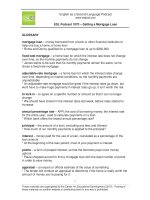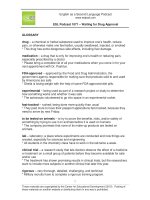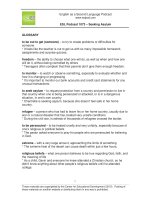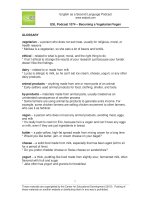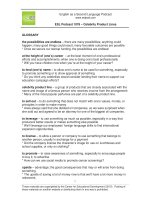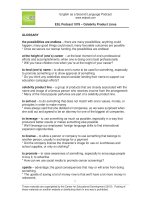ESL podcast 1076 – celebrity product lines
Bạn đang xem bản rút gọn của tài liệu. Xem và tải ngay bản đầy đủ của tài liệu tại đây (101.02 KB, 10 trang )
English as a Second Language Podcast
www.eslpod.com
ESL Podcast 1076 – Celebrity Product Lines
GLOSSARY
the possibilities are endless – there are many possibilities; anything could
happen; many good things could result; many favorable outcomes are possible
* Once we secure our startup funding, the possibilities are endless!
at the height of (one’s) career – at the best moment of one’s professional
efforts and accomplishments; when one is doing one’s best professionally
* Will you have children now when you’re at the height of your career?
to lend (one’s) name – to allow one’s name to be used for something, especially
to promote something or to show approval of something
* Do you think any celebrities would consider lending their name to support our
education campaign efforts?
celebrity product line – a group of products that are closely associated with the
name and image of a famous person who receives income from the arrangement
* Many of the most popular perfumes are part of a celebrity product line.
to sell out – to do something that does not match with one’s values, morals, or
principles in order to make money
* Arwa always said that she disliked oil companies, so we were surprised when
she sold out and agreed to be an attorney for one of the biggest oil companies.
to leverage – to use something as much as possible, especially in a way that
producers better results or makes something else possible
* We’ll leverage our employees’ foreign language skills to find international
expansion opportunities.
to license – to allow a person or company to use something that belongs to
another person, usually in exchange for a payment
* Did the company license the character’s image for use on lunchboxes and
school supplies, or only on clothing?
to promote – to raise awareness of something, especially to encourage people
to buy it; to advertise
* How can we use social media to promote cancer screenings?
upside – advantage; the good consequences that may or will arise from doing
something
* The upside of saving a lot of money now is that we’ll have a lot more money in
retirement.
1
These materials are copyrighted by the Center for Educational Development (2015). Posting of
these materials on another website or distributing them in any way is prohibited.
English as a Second Language Podcast
www.eslpod.com
ESL Podcast 1076 – Celebrity Product Lines
brand – the name and logo associated with a certain product or type of products
made and packaged by a single company
* Which brand of toothpaste do you prefer?
longevity – a measure of how long something lasts; long life; a long existence
* Eating well, getting exercise, and having good friends are some of the factors
contributing to longevity.
to hedge (one’s) bets – to reduce one’s risks and protect oneself from the
consequences of making the wrong choice or a poor decision
* The stock market usually produces good returns, but we’re hedging our bets by
also investing in real estate, precious metals, and art.
to get a piece of the pie – to obtain part of something; to have a portion of or
share in something
* Clark funded only 20% of the startup costs, but now he’s arguing that he should
get a bigger piece of the pie when we sell the company because it was originally
his idea.
while the getting is good – to get or obtain something while it is still available,
before it disappears or it taken by other people
* If we arrive too late, all the good seats will be taken. Let’s save our spots while
the getting is good!
merchandise – products that are available for purchase; goods that are being
sold
* Most of our merchandise is being sold at a 20% discount today.
clothing line – clothes sold under a particular brand; the clothes sold by one
company
* The company has three clothing lines: one for teenage girls, one for young
professionals, and one for older women.
to branch out – to expand into another area or field that is less familiar
* We used to specialize in kitchen appliances, but now we’re branching out into
other kinds of consumer electronics.
the sky’s the limit – a phrase meaning that there are many possibilities, and
there are no limitations or restrictions on the available options; there are many
choices
* If you can imagine it, our talented engineers and designers can create it. The
sky’s the limit!
2
These materials are copyrighted by the Center for Educational Development (2015). Posting of
these materials on another website or distributing them in any way is prohibited.
English as a Second Language Podcast
www.eslpod.com
ESL Podcast 1076 – Celebrity Product Lines
COMPREHENSION QUESTIONS
1. What does Jessica mean when she says, “Wouldn’t people think I was selling
out?”
a) She’s worried people will think she’s doing something that doesn’t match with
her values and beliefs.
b) She’s worried that people will think she is ending her career as a performer.
c) She’s worried that people will think her products are too expensive.
2.
a)
b)
c)
Why does Nick refer to “a piece of the pie”?
Because he thinks Jessica should start selling baked goods.
Because he thinks Jessica should have some of the money.
Because he thinks Jessica needs to eat more desserts.
______________
WHAT ELSE DOES IT MEAN?
to lend (one’s) name
The phrase “to lend (one’s) name,” in this podcast, means to allow one’s name to
be used for something, especially to promote something or to show approval of
something: “I lent my name to this fundraising event, but it’s turning out to be a
disaster!” The phrase “to lend an ear” means to listen to someone
sympathetically: “Thanks for lending an ear and letting me talk about my
problems for a while.” The phrase “to lend (one’s) support” means to support or
help someone or something: “The teachers have lent their support to efforts to
start a music program.” Finally, the parse “to lend (someone) a hand” means to
help someone, especially with a physical activity: “Could you please lend me a
hand with these heavy boxes?”
upside
In this podcast, the word “upside” means an advantage, or the good
consequences that may or will arise from doing something: “Sure, the rain is
unpleasant, but the upside is that the crops will grow really well.” A “downside” is
a disadvantage or the negative consequences of something: “Winning that trip to
Florida was great, but the downside was that the dates were in the middle of
hurricane season.” The phrase “upside the head” describes the side of
someone’s head: “Be careful! You almost hit Jake upside the head with that long
board!” Finally, the phrase “upside down” means with the top part at the bottom
and the bottom part at the top: “Did you know that modern painting is hanging
upside down?”
3
These materials are copyrighted by the Center for Educational Development (2015). Posting of
these materials on another website or distributing them in any way is prohibited.
English as a Second Language Podcast
www.eslpod.com
ESL Podcast 1076 – Celebrity Product Lines
CULTURE NOTE
Celebrity Product Lines
Many celebrity product lines are “a match made in heaven” (two things that are
very well suited for each other. The most successful celebrity product lines
usually “capitalize on” (take advantage of) a “link” (connection) between the
celebrity’s “talent” (what one does very well) and the product. People who
“admire” (like something or someone very much) the celebrities are “drawn”
(attracted) to the products that feature those celebrities’ names and images, and
become more likely to buy those products. “Subconsciously” (without being
aware of something), they may hope that buying and using those products
makes them similar to the celebrities whom they admire so much.
For example, soccer “pro” (a professional athlete) David Beckham has a celebrity
line of “body wear” (underclothes; clothing that is normally worn underneath other
clothes) at H&M retail stores, called “David Beckham Bodywear.” He also has his
own line of perfumes and other “personal care” (related to health and
appearance) products.
Singer and actress Jennifer Lopez also has her own line of clothing and perfume,
as well as a restaurant and her own company for television productions. Talk
show host and actress Oprah Winfrey has her own magazine, as does
entrepreneur and expert “hostess” (related to welcoming guests in one’s home)
Martha Stewart, who also has an “extensive” line of “house wares” (products
used in the home), office organizational supplies, materials for “arts and crafts”
(artistic items made by hand), and more.
______________
Comprehension Questions Correct Answers: 1 – a; 2 – b
4
These materials are copyrighted by the Center for Educational Development (2015). Posting of
these materials on another website or distributing them in any way is prohibited.
English as a Second Language Podcast
www.eslpod.com
ESL Podcast 1076 – Celebrity Product Lines
COMPLETE TRANSCRIPT
Welcome to English as a Second Language Podcast number 1,076 – Celebrity
Product Lines.
This is English as a Second Language Podcast episode 1,076. I’m your host, Dr.
Jeff McQuillan, coming to you from the Center for Educational Development in
beautiful Los Angeles, California.
Visit our website at ESLPod.com. Download a Learning Guide for this episode
that contains all of the vocabulary words and definitions we use on this episode,
as well as a complete transcript.
This episode is a dialogue between Nick and Jessica about selling things using
the name of a famous person. Let’s get started.
[start of dialogue]
Nick: The possibilities are endless! You have to take advantage of being at the
height of your career.
Jessica: I don’t know about lending my name to a celebrity product line. Wouldn’t
people think I was selling out?
Nick: Of course not. Most celebrities do it nowadays. People expect you to
leverage your fame into a successful business.
Jessica: But licensing my name to a lot of products that I would then have to
promote isn’t exactly how I want to spend my time.
Nick: But think of the upside. You would be building a brand with longevity,
hedging your bets for the future.
Jessica: You mean in the future when I’m no longer as famous or as popular.
Nick: No, of course that’s not what I mean. You’ll be a star forever. But don’t you
want to get a piece of the pie while the getting is good?
Jessica: I don’t know. What kind of merchandise are we talking about?
Nick: We can start with a clothing line and then branch out into household
products, luggage, and even weight-loss products.
5
These materials are copyrighted by the Center for Educational Development (2015). Posting of
these materials on another website or distributing them in any way is prohibited.
English as a Second Language Podcast
www.eslpod.com
ESL Podcast 1076 – Celebrity Product Lines
Jessica: Weight-loss products?! What are you implying?
Nick: Nothing! I didn’t mean weight-loss products. I meant food – glamorous,
beautiful food. See what I mean? The sky’s the limit!
[end of dialogue]
Nick begins our dialogue by saying to Jessica, “The possibilities are endless.” A
“possibility” is something that could happen. When we say something is “endless”
(endless), we mean that there is no maximum – it could be as many as possible.
“The possibilities are endless,” then, means that there are many possibilities.
Usually we’re talking about good things that could happen.
Nick says to Jessica, “You have to take advantage of being at the height of your
career.” “To be at the height (height) of your career (career)” means that you are
at the best moment or the most successful moment in your line of work, in what
you do. Your “career” is your job. It’s the thing that you do to make money,
usually. “To be at the height” of something means to be at the highest point – to
be at a point where, in this case, you are the most successful. Perhaps you are
making the most money that you will ever make, or you are more popular than
you will ever be.
Jessica says, “I don’t know about lending my name to a celebrity product line.”
“To lend” (lend) means to let someone use something for a period of time.
Jessica is talking about “lending her name.” “To lend your name” means to let
your name be associated with something else. In the United States, it’s popular
for certain movie stars or music stars to lend their name to certain products,
things that companies sell. Sometimes they actually sell the product using the
name of the person.
So, for example, there might be a kind of perfume that is sold using the name of
some famous actress or singer. “Perfume” (perfume) is liquid that you put on
your body to make you smell nice. Usually we use the term “perfume” to refer to
what a woman would put on her body. Jessica doesn’t know about – she’s not
sure about – lending her name to a celebrity product line. A “celebrity” (celebrity)
is a famous person. A famous actor, a famous singer, a famous podcaster – all of
these could be celebrities, except that last example.
“Product” refers to something that you sell. A “product line” is a group of
products, a group of related things that you would sell. So, a “celebrity product
line” would be a group of things that are sold using the name of a famous person.
6
These materials are copyrighted by the Center for Educational Development (2015). Posting of
these materials on another website or distributing them in any way is prohibited.
English as a Second Language Podcast
www.eslpod.com
ESL Podcast 1076 – Celebrity Product Lines
Jessica says, “Wouldn’t people think I was selling out?” The phrasal verb “to sell
out” has a couple of different meanings. Here it means to do something in order
to make money, but to do something that somehow doesn’t match with your
principles or your morals or your values or your identity, even.
So, for example, a popular singer writes a song. The song becomes a “hit,”
meaning it becomes very successful, and then a few years later, the singer will
sell this song, or the rights to use the song, to a company in order for the
company to use that song in a commercial. Some people would say that the
artist, the singer, has “sold out.” “He sold out,” meaning he’s decided that he was
going to get money for what he wrote rather than keeping himself as a real artist.
I don’t know if this is really true – if you could consider someone selling their
song to be “selling out” – but that’s the idea behind the phrasal verb “to sell out.”
The other possibility or the other possible meaning of the verb “to sell out” would
be for a store to sell all that it has of a certain product – to no longer have any
available because they have all been sold.
Nick doesn’t think Jessica would be selling out. He says, “Most celebrities do it
nowadays. People expect you to leverage your fame into a successful business.”
“To leverage” (leverage) means to use something that you have now in order to
get something better in the future. “To leverage your influence,” for example,
would mean to use your influence in order to get a better situation, or perhaps to
make more money. “Leveraging your celebrity” would be to use your fame, the
fact that you are popular, in order to make even more money, or perhaps to
become even more famous.
Jessica says, “But licensing my name to a lot of products that I would then have
to promote isn’t exactly how I want to spend my time.” Jessica is saying that she
doesn’t want to license her name to a lot of products. “To license” (license)
means to allow or to let another company or another person use something that
you have created. You might, for example, write a song, and then you let another
person use that song in order to make money. You would “license” the song to
that person, meaning that person has to give you some money for using your
song.
Jessica doesn’t want to have to promote a lot of products. “To promote” here
means to let people know about something – to go out and tell people, in this
case, to buy these products. When a writer publishes a book, he or she often
goes and promotes the book by going on television programs and radio
interviews and that sort of thing.
7
These materials are copyrighted by the Center for Educational Development (2015). Posting of
these materials on another website or distributing them in any way is prohibited.
English as a Second Language Podcast
www.eslpod.com
ESL Podcast 1076 – Celebrity Product Lines
Nick says, “But think of the upside.” The “upside” (upside) of something is the
advantage of something, the good result or consequence that can happen if you
do a certain thing. The upside of saving a lot of money now when you’re young is
that when you are old, you will have money to live on. The “upside” is the
advantage. The opposite of “upside” is, of course, “downside” (downside). The
downside of something would be the disadvantage, the negative consequence of
some action.
Nick says, “You would be building a brand with longevity, hedging your bets for
the future.” A “brand” (brand) is a name or a symbol that is associated with a
certain kind of product. You can think of, for example, the kind of toothpaste that
you use in the morning to clean your mouth, to brush your teeth. The toothpaste
is made by a certain company. The name would be the brand of that toothpaste.
Often that same brand, that same name, will be used with the whole set of
products, a “line” of products, we might call them.
“Longevity” (longevity) refers to how long something lasts; usually it refers to a
long life or a long existence. Nick is talking about Jessica’s brand as having
longevity. It will survive for many years. This will allow her “to hedge her bets.”
“To hedge (hedge) your bets (bets)” means to reduce your risk, to protect
yourself against bad things that might happen in the future. Nick is saying here
that if Jessica gives her name to all of these different products, she would make
a lot of money now, and then she wouldn’t perhaps have to worry about making
money in the future.
Jessica says, “You mean in the future when I’m no longer as famous or as
popular?” Nick says, “No, of course that’s not what I mean.” Jessica is concerned
that sometime in the future, she won’t be popular. Nick doesn’t want her to think
that – doesn’t want her to think that Nick believes that someday she won’t be
popular. Of course, we all know that eventually celebrities lose their popularity,
are no longer popular.
Nick says, “You’ll be a star forever,” meaning you will be famous forever. “But
don’t you want to get a piece of the pie while the getting is good?” There are two
expressions here. The first one is “a piece of the pie” or “to get a piece of the pie”
(pie). “To get a piece of the pie” here refers to get part of something, to obtain a
part of something, often some amount of money. And that’s what Nick is talking
about here. A “pie” is normally a dessert that you eat, but here it’s referring
simply to getting some money that is available to be got.
The second expression is “while the getting is good.” “While the getting (getting)
is good” means to get something before it disappears – to get something while
8
These materials are copyrighted by the Center for Educational Development (2015). Posting of
these materials on another website or distributing them in any way is prohibited.
English as a Second Language Podcast
www.eslpod.com
ESL Podcast 1076 – Celebrity Product Lines
there is still an opportunity to get it. Jessica says, “I don’t know. What kind of
merchandise are we talking about?” “Merchandise” (merchandise) are products,
things that you can buy, things that are sold by companies. “Merchandise”
usually refers to physical products. Jessica wants to know what kind of
merchandise Nick is talking about.
Nick says “We can start with a clothing line, and then branch out into household
products, luggage, and even weight-loss products.” A “clothing line” would be
clothes that are sold under a particular name – shirts, pants, dresses, that sort of
thing. The phrasal verb “to branch (branch) out” means to go into a different area,
a different kind of, in this case, product from the one that you started with. A
celebrity might start with selling shirts that have his name on it, and then he could
branch out and sell pants and shoes and socks and other types of clothing. That
would be “branching out.”
Nick is suggesting that Jessica can branch out into all sorts of things after she
starts selling clothing. One of the things you can start selling in the future is
“weight-loss” products. “Weight loss” refers to becoming thinner, losing some of
the weight that you have, not being as fat as you are now. I mean, I’m not saying
you’re fat – you, who are listening to this episode – but you know, people in
general. Americans have this problem. Jessica says, “What are you implying?”
She thinks that Nick is calling her fat, and of course, you never want to call a
woman fat.
Nick says, “I’m not implying anything,” meaning I’m not saying that you are
overweight. “I didn’t mean weight-loss products. I mean” – and then he changes
his idea – “food – glamorous, beautiful food. See what I mean?” – meaning “Do
you understand me?” – “The sky’s the limit!” The expression “the sky’s (sky’s) the
limit” means that there are many, many possibilities – many things that you can
do. There are no limits. There are no restrictions. You have a lot of choices,
usually good choices.
Now let’s listen to the dialogue, this time at a normal speed.
[start of dialogue]
Nick: The possibilities are endless! You have to take advantage of being at the
height of your career.
Jessica: I don’t know about lending my name to a celebrity product line. Wouldn’t
people think I was selling out?
9
These materials are copyrighted by the Center for Educational Development (2015). Posting of
these materials on another website or distributing them in any way is prohibited.
English as a Second Language Podcast
www.eslpod.com
ESL Podcast 1076 – Celebrity Product Lines
Nick: Of course not. Most celebrities do it nowadays. People expect you to
leverage your fame into a successful business.
Jessica: But licensing my name to a lot of products that I would then have to
promote isn’t exactly how I want to spend my time.
Nick: But think of the upside. You would be building a brand with longevity,
hedging your bets for the future.
Jessica: You mean in the future when I’m no longer as famous or as popular.
Nick: No, of course that’s not what I mean. You’ll be a star forever. But don’t you
want to get a piece of the pie while the getting is good?
Jessica: I don’t know. What kind of merchandise are we talking about?
Nick: We can start with a clothing line and then branch out into household
products, luggage, and even weight-loss products.
Jessica: Weight-loss products?! What are you implying?
Nick: Nothing! I didn’t mean weight-loss products. I meant food – glamorous,
beautiful food. See what I mean? The sky’s the limit!
[end of dialogue]
How good can you English be if you continue listening to ESL Podcast? Well, the
sky’s the limit. There are many, many possibilities if you continue listening to the
wonderful scripts by our wonderful scriptwriter, Dr. Lucy Tse.
From Los Angeles, California, I’m Jeff McQuillan. Thank you for listening. Come
back and listen to listen to us again right here on ESL Podcast.
English as a Second Language Podcast was written and produced by Dr. Lucy
Tse, hosted by Dr. Jeff McQuillan. Copyright 2015 by the Center for Educational
Development.
10
These materials are copyrighted by the Center for Educational Development (2015). Posting of
these materials on another website or distributing them in any way is prohibited.

